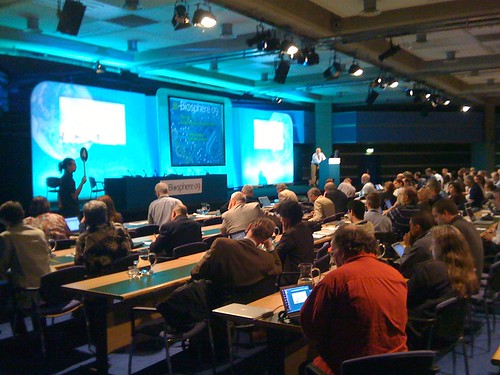In the previous post I suggested that a productive way to meet EOL's goal of a web page per taxon would be to build upon Wikipedia, rather than go it alone.
iPhylo

Time for more half-baked ideas. There's been a lot of discussion on Twitter about EOL, Linked Data (sometimes abbreviated LOD), and Wikipedia. Pete DeVries (@pjd) is keen on LOD, and has been asking why TDWG isn't playing in this space. I've been muttering dark thoughts about EOL, and singing the praises of Wikipedia.

The problem of displaying large taxonomic classifications on a web page continues to be an on again-off again obsession. My latest experiment makes use of Nicolas Garcia Belmonte's wonderful JavaScript Infovis Toolkit (JIT), which provides implementations of classic visualisations such as treemaps, hyperbolic trees, and SpaceTrees. SpaceTrees were developed at Maryland's HCIL lab, and that lab has applied them to biodiversity informatics.
Chris Freeland has written a thoughtful summary of his experiences of the two-day closed session to create a road map for biodiversity informatics, entitled #ebio09, silverbacks, & haiku.
This post is likely to seem somewhat off the wall, given the rush to getting everything in the cloud, but it's Friday, so let's give it a whirl.One idea I've been toying with is dispensing with relational databases, wikis, etc. and just storing taxonomic data using files and folders on a disk.

So, e-Biosphere '09 is over (at least for the plebs like me, the grown ups get to spend two days charting the future of biodiversity informatics). It was an interesting event, on several levels. It's late, and I'm shattered, so this post ill cover only a few things.This was first conference I'd attended where some of the participants twittered during proceedings.
I've put the slides for my e-Biosphere 09 challenge entry on SlideShare.e-Biosphere '09 ChallengeView more OpenOffice presentations from rdmpage.Not much information on the other entries yet, except for the eBiosphere Citizen Science Challenge, by Joel Sachs and colleagues, which will demonstrate a "global human sensor net". Their plan is to aggregate observations posted on Flickr, Twitter, Spotter, and email.
Over on the EOL blog is a summary of a meeting Visualizing the Evolutionary Tree of Life. This sounds like it was a fun meeting, but part of me is suffering from déjà vu. Our community has tossed this subject around for a while now.

e-Biosphere '09 kicks off next week, and features the challenge:Originally I planned to enter the wiki project I've been working on for a while, but time was running out and the deadline was too ambitious. Hence, I switched to thinking about RSS feeds. The idea was to first create a set of RSS feeds for sources that lack them, which I've been doing over at http://bioguid.info/rss, then integrate these feeds in a useful way.

For the last two days I've been participating in a NESCent meeting on Dryad, a "repository of data underlying scientific publications, with an initial focus on evolutionary biology and related fields". The aim of Dryad is to provide a durable home for the kinds of data that don't get captured by existing databases such as GenBank and TreeBASE (for example, the Excel spreadsheets, Word files, and tarballs of data that, if they are lucky, make it